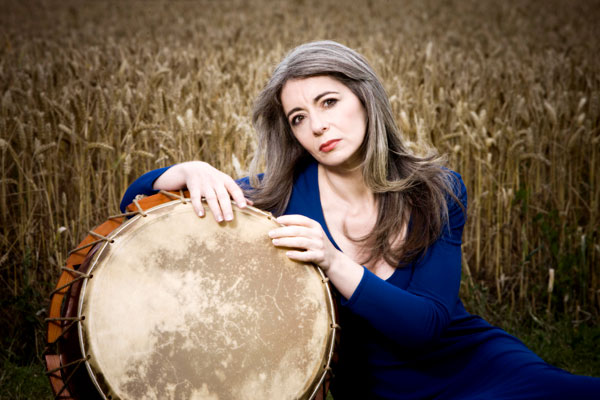
 'Taken 2' grabs movie box office crown
'Taken 2' grabs movie box office crown
 Rihanna's 'Diamonds' tops UK pop chart
Rihanna's 'Diamonds' tops UK pop chart
 Fans get look at vintage Rolling Stones
Fans get look at vintage Rolling Stones
 Celebrities attend Power of Women event
Celebrities attend Power of Women event
 Ang Lee breaks 'every rule' to make unlikely new Life of Pi film
Ang Lee breaks 'every rule' to make unlikely new Life of Pi film
 Rihanna almost thrown out of nightclub
Rihanna almost thrown out of nightclub
 'Dark Knight' wins weekend box office
'Dark Knight' wins weekend box office
 'Total Recall' stars gather in Beverly Hills
'Total Recall' stars gather in Beverly Hills
Deaf percussionist seamlessly blends East and West
Updated: 2012-09-28 09:44
By Chen Jie (China Daily)
|
||||||||
 |
|
Evelyn Glennie lost her hearing at 12, but as a result has a deeper understanding of the music she loves. Provided to China Daily |
Evelyn Glennie may not be a familiar name to most Chinese, but many people remember the 1,000 drummers at the Opening Ceremony of the London Olympic Games in July.
It was Glennie, the Grammy-winning percussionist and composer, collaborating with the English electronic band Underworld, who led the drummers to perform And I Will Kiss and Caliban's Dream on the instrument called the aluphone. Glennie was the one who accompanied the lighting of the flame.
On Oct 5, Glennie will perform at the National Center for the Performing Arts with Nuremberg Symphony Orchestra to close the NCPA International Percussion Festival 2012.
Glennie became almost completely deaf by 12 but her hearing loss brought her a deeper understanding of the music she loves. "She is one of the few percussionists I admire most," says Li Biao who is an established percussionist himself and music director of NCPA's International Percussion Festival.
"It's hard to imagine a musician with weak hearing. Beethoven maybe the only example you know. But Glennie is really a genius. I love her innovative performances," says Li, adding that they scheduled this concert long before the Olympic night that made her known worldwide.
She will play Chinese composer Chen Yi's Percussion Concerto, which was commissioned by Singapore Symphony for her and premiered in 1999.
The concerto is a subtle showcase of Glennie's skill.
Chen was among the first students who learned Western music at Beijing's Central Conservatory of Music after the "cultural revolution" (1966-76), together with Tan Dun, Chen Qigang, Guo Wenjing and composer Zhou Long, who later became her husband.
Most of her classmates are now world-renowned musicians, famed for blending Chinese elements with Western classical music and establishing unique Chinese contemporary music.
In Percussion Concerto, Chen combines Chinese folk sounds with Western music. In the first two minutes, you can hear the astonishing range of sounds made by a collection of traditional Chinese gongs, and when the orchestra enters, it feels effortlessly oriental. Then follows the melody of Peking Opera mixing vocals with Glennie's percussion.
This year is the second edition of NCPA's International Percussion Festival.
Li, music director of NCPA's International Percussion Festival, says Beijing's audiences have plenty of choices in terms of piano or violin recitals or grand symphony concerts and operas, but percussion remains relatively in the shadows.
"People only know drum, gong, triangle or some may know marimba. We launch the event to gather the world's most famous percussionists to show that we have hundreds of strange instruments they have never seen and can produce all kinds of sounds," Li says.
On Sept 27, he and Saxony Wind Philharmonic launched the weeklong festival with Joseph Schwantner's Concerto for Percussion Orchestra.
On Oct 2, the Berlin Philharmonic Percussion Group and Beijing Symphony Orchestra will perform a world premiere of Ludwig Albert's Marimba Concerto. Albert will play the marimba, while Li will take the baton on the podium. In the second half of the concert, Li's student Meng Ke and Berlin's percussion group will play Dance of the Century. Created by Li, this piece also features a fusion sound of East and West.
On Oct 3, the festival will also present a concert named Star Tomorrow, featuring young percussionists from both China and Germany.
chenjie@chinadaily.com.cn
Most Viewed
Editor's Picks

|

|

|

|

|

|
Today's Top News
Health new priority for quake zone
Xi meets US top military officer
Japan's boats driven out of Diaoyu
China mulls online shopping legislation
Bird flu death toll rises to 22
Putin appoints new ambassador to China
Japanese ships blocked from Diaoyu Islands
Inspired by Guan, more Chinese pick up golf
US Weekly

|

|







